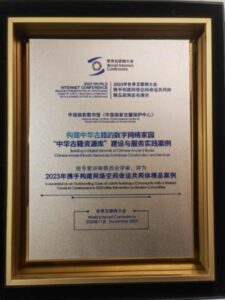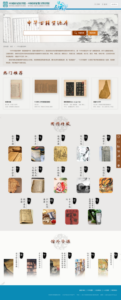“Building a Digital Network of Chinese Ancient Books” Chinese Ancient Books Resources Database Construction and Services
27 أبريل 2024
The 2023 World Internet Conference was held in Wuzhen, Zhejiang Province on November 7, 2023. Themed “Jointly Building a Community with a Shared Future in Cyberspace.” 13 outstanding high-integration-degree cases with significant international influence, outstanding inclusive value, and diverse presentation forms were selected from numerous cases involving 200 countries and regions. They were chosen by the review committee which was composed of 30 authoritative experts from various fields around the world.

The case “Building a Digital Network of Chinese Ancient Books — Chinese Ancient Books Resources Database Construction and Services,” submitted by National Library of China (National Centre for the Preservation and Conservation of Ancient Books), was selected as one of the outstanding examples of international exchanges and cooperation in cyberspace in recent years. At the press conference, Zhang Zhiqing, the case publisher, also Executive Deputy Director of the National Library of China, and Deputy Director of the National Centre for the Preservation and Conservation of Ancient Books, delivered a lecture on how ancient Chinese books can be rejuvenated in the digital world.

Ancient books are important carriers of Chinese civilisation. To meet the diversified needs of readers in the networked context of informatisation, the National Library of China has attached great importance to building digital resources since the 1980s. The “Chinese Ancient Books Preservation & Conservation Project” was established in 2007 with the purpose of “protecting ancient books, inheriting our civilisation, serving the society”. Through this project, the digitalisation of ancient books and the sharing of resources has been constantly promoted over the past years. The Chinese Ancient Books Resources Database, officially launched in 2016, actively collaborate with domestic and foreign collecting institutions. Through solicitation and donation, the database effectively integrates collection resources and disseminates its abundant digital resources on ancient books and special collections. By crossing national boundaries to serve academic and public use, the sharing of ancient books resources showed the world the lasting charm of Oriental culture.
As of today, Chinese Ancient Books Resource Database had released 24 full-text image sub-libraries, including the inscriptions on bones or tortoise shells of the Shang Dynasty, the Dunhuang Posthumous Papers, rare copies of Song, Yuan, Ming and Qing Dynasty, the Yongle Canon, rubbings of inscription, ancient books in ethnic characters, old photos, and New Year pictures, etc., to the world for public benefit. It covers almost all types of precious documents of Chinese civilisation, with total resources of more than 103,000 volumes/pieces, 26.4 million pages, and 1,013 terabyte.
The most attractive feature to the World Internet Conference expert judges was the international cooperation undertaken in developing the Chinese Ancient Books Resource Database. For example, for the International Dunhuang, a representative example of international cooperation in the digitisation of special collections of ancient books, the National Library of China initiated and worked together with Dunhuang literature collection institutions around the world to integrate the Dunhuang Western Regions documents on a unified platform, among which the total amount of National Library contents reached 235,000 widths, accounting for 40% of the total, ranking top of all cooperative institutions.
Through similar international digital cooperation projects, 1.76 million ancient book resources were collected or donated by overseas collection institutions such as the Harvard-Yenching Library of Harvard University in the United States, the Institute for Advanced Studies on Asia in University of Tokyo, Japan, Bibliothèque Nationale de France, and the Eisei-Bunko Museum Japan. Such international exchanges and cooperation centred on precious Chinese classics not only fulfilled the donors’ wish to serve global readers, but also enabled international scholars to delve into the collection of ancient Chinese books around the world, thus forming a Chinese cultural community in cyberspace.
In 2020, the Chinese Ancient Books Resource Database significantly enhanced its service efficiency through the launch of a comprehensive set of features, including registration-free and sign-in-free service, unified search of the whole database, high-definition display, and sped-up access. As a result, the database’s usage increased dramatically with the total click volume reaching 300 million in the past three years, ranking highly in the types and varieties of ancient book resource among comprehensive resource sharing and publishing platforms. This has drastically changed the way readers use ancient books resources of the library. Such an easy-to-use database, with its significant advantage of collection rarity and systematicity, effectively alleviated the contradiction between preservation and usage. Its value lies not only in preserving ancient books but also in providing a platform for everyone to obtain knowledge of Chinese classics accessibly with an attitude of openness and sharing.
Driven by the Chinese Ancient Books Resource Database, other institutions across the country actively participated in the joint release of ancient book digital resources organised by National Centre for the Preservation & Conservation of Ancient Books. As a result, rare copies of Song, Yuan, Ming and Qing Dynasty, rubbings of inscription, and quantities of local chronicles, genealogies and other unique ancient book resources were openly shared online. The total accumulated collection size has since exceeded 28,000 volumes.

Civilisations are enriched through exchanges and mutual learning. The National Library of China (National Centre for the Preservation & Conservation of Ancient Books) will further intensify its efforts to share more ancient books of high quality. Through the construction of the Smart Library System, a community of Chinese traditional culture will be developed to spread the charms of precious Chinese classics across time and space to benefit the public. Rejuvenated in the digital world with vigour and vitality, Chinese classics will contribute to the commemoration of Chinese culture and play a more significant role in the exchanges and mutual learning of global cultures.
Contributed by Li Shuai, IFLA-PAC China Centre, National Library of China